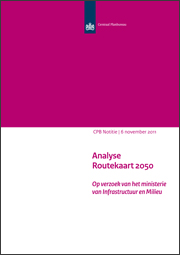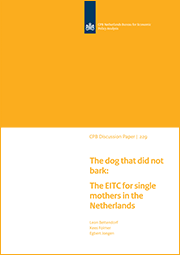Search results
January 23, 2015
Technological Uncertainty in Meeting Europe’s Decarbonisation Goals

November 6, 2011
Analyse Routekaart 2050

April 15, 2009
Why do macro wage elasticities diverge?
March 26, 2009
Why do macro wage elasticities diverge? A meta analysis
Publication year
Authors
- Kees Folmer (23)
- Ed Westerhout (5)
- Sonny Kuijpers (4)
- Egbert Jongen (3)
- Aenneli Houkes - Hommes (2)
- Anja Deelen (2)
- Bas Scheer (2)
- Derk Visser (2)
- Esther Mot (2)
- Hein Mannaerts (2)
- Johannes Bollen (2)
- Joost van Gemeren (2)
- Koen van der Ven (2)
- Leon Bettendorf (2)
- Rob Aalbers (2)
- Rob Euwals (2)
- Rudy Douven (2)
- Sander Hoogendoorn (2)
- Yvonne Adema (2)
- Annemiek Verrips (1)
- Eduard Ponds, Bastiaan Starink (Netspar) (1)
- Gerbert Romijn (1)
- Harro van Heuvelen (1)
- Jochem Zweerink (1)
- Jonneke Bolhaar (1)
- Jos Ebregt (1)
- Karen van der Wiel (1)
- Krista Hoekstra (1)
- Marcel Lever (1)
- Marente Vlekke (1)
- Paul Verstraten (1)
- Peter Arts (1)
- Rik Dillingh (1)
- Rob Luginbuhl (1)
- Simon Rabaté (1)
- Victoria Chorny (1)
- Show all
Tags
- Labour (10)
- Labour market (9)
- Education and Science (5)
- General welfare (5)
- Knowledge and Innovation (5)
- Built environment (4)
- Physical environment (4)
- Health care (3)
- Welfare state (3)
- Risk and regulation (2)
- Climate and Environment (1)
- Competition and regulation (1)
- Long-term outlook (1)
- Macroeconomics (1)
- Pensions and population ageing (1)
- Sustainability and circular economy (1)
- Show all

